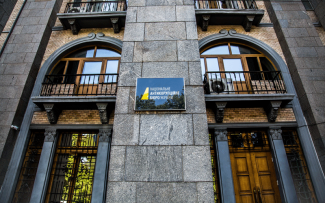Ukraine: the independence of anti-corruption bodies is being dismantled amid scandals involving top politicians

On 22 July, the Verkhovna Rada passed a law (with 263 votes in favour and 13 against) that effectively dismantles the independence of the National Anti-Corruption Bureau (NABU) and the Special Anti-Corruption Prosecutor’s Office (SAP) by placing them under the authority of the Prosecutor General. That same day, President Volodymyr Zelensky signed the bill into law, stating that it was necessary due to the need to combat Russian infiltration. The adoption of the law was preceded by searches conducted by the Security Service of Ukraine (SBU), which is subordinate to the government, of the premises of NABU and SAP, under the pretext of countering Russian influence within those institutions. Protests erupted in Ukraine’s major cities in response to what was seen as an attack on anti-corruption bodies. The opposition began collecting signatures to refer the law to the Constitutional Court.
The adoption of the law marks the culmination of a broader campaign involving the use of the state apparatus to exert pressure on independent institutions. On 18 July, the State Bureau of Investigation (DBR) searched the home of Vitaliy Shabunin, head of the Anti-Corruption Action Centre NGO and a vocal critic of President Zelensky. Alongside this, media outlets linked to the government launched a smear campaign against the journalist Inna Vedernikova and her husband (Ms Vedernikova is known for her critical stance towards the government). The unlawful blocking of the appointment of Oleksandr Tsyvinskyi as head of the Bureau of Economic Security (BEB), justified by alleged concerns over the protection of sensitive information (Tsyvinskyi’s father resides in Russia), is a further sign of the government’s intent to bring anti-corruption and law enforcement agencies under their control.
These developments coincide with corruption scandals involving two former deputy prime ministers: Oleksiy Chernyshov (former Minister for National Unity) and Olha Stefanishyna (former Minister for European Integration and Justice). The actions taken by the government have come in response to investigations targeting high-ranking politicians and are an attempt to prevent similar cases from emerging in the future. At the same time, given the current international context, it seems that the Ukrainian government does not expect negative repercussions from its Western partners – an assessment that further incentivises continued attacks on independent institutions.
Taking over control of NABU and SAP
The law adopted on 22 July effectively dismantles the independence of NABU and SAP. It stipulates that the Prosecutor General will have access to all NABU cases and may grant access to any other prosecutor. He has also been granted the authority to issue binding instructions to NABU investigators and, in the event of non-compliance, to reassign cases to other bodies. Since June 2025, the position of Prosecutor General has been held by Ruslan Kravchenko, who is considered to be closely aligned with the Office of the President. The extensive powers vested in him allow for the obstruction of investigations, interference in how they proceed, and the transfer of cases from NABU to prosecutors under his control – depending on the expectations of the president’s inner circle.
The attempt to bring NABU and SAP under political control was preceded by unlawful searches carried out on 21 July, based on allegations that some NABU detectives were cooperating with Russia. These actions served as a pretext for passing the law, the contents of which were not made public beforehand. The SBU, which is subordinate to the president, claimed it had uncovered misconduct: one detective allegedly assisted his father in selling industrial hemp to Russia’s Dagestan region; another was accused of leaking classified information to the Russian intelligence services through contact with Fedir Khrystenko, a former MP from the banned Opposition Platform – For Life party (who has been formally charged with treason by the SBU).
On the same day, the SBU also conducted an inspection of the state of classified information security at the SAP. The searches were carried out without a warrant, rendering them illegal: the law permits warrantless searches only in cases where there is a threat to human life or health, or where there is a risk of evidence being destroyed – none of which applied in this instance.
It is possible that the government’s next step will be to discredit and dismiss the current leadership of NABU and SAP. The head of NABU, Semen Kryvonos, unsuccessfully called on the president to veto the law and stated that parliament had effectively dismantled Ukraine’s anti-corruption infrastructure. He also noted that he had anticipated an operation against his agency due to political pressure linked to investigations involving senior Ukrainian officials. This situation will likely lead to the near-total consolidation of control over anti-corruption bodies and law enforcement agencies in the hands of the President’s Office.
Corruption scandals within the government
The recent actions appear to be a response to the growing independence of Ukraine’s two main anti-corruption institutions, which have shown resolve in investigating high-ranking political figures. In June, NABU brought charges against then Deputy Prime Minister and Minister for National Unity Oleksiy Chernyshov (a close friend of the Zelensky family) in connection with a corruption scandal involving an attempt by a property developer to illegally acquire land. This case was likely one of the key factors behind the recent government reshuffle (see ‘Ukraine: new government led by Yuliia Svyrydenko’). In July, SAP also launched an investigation into a scandal involving Olha Stefanishyna, who until 17 July served as Deputy Prime Minister for European and Euro-Atlantic Integration and Minister of Justice. Companies linked to her former husband were allegedly favoured in auctions of assets confiscated in economic crime cases.
The curtailment of independence for both institutions appears to be preventative in nature. According to media reports, NABU had been planning to bring charges against one of President Zelensky’s closest aides, Tymur Mindich, as well as several MPs from the Servant of the People party, in connection with irregularities in drone production contracts. Gaining control over NABU and SAP will allow the government to interfere in the course of these investigations.
Anti-corruption activists and journalists under pressure
This is not the only recent instance of the security services being used to target independent individuals and institutions. On 10 July, the DBR conducted a search of the home of Vitaliy Shabunin, head of the Anti-Corruption Action Centre. Proceedings against him were initiated as early as March 2024, based on allegations of evading military service and document forgery. Shabunin himself described the situation as the ‘construction of a corrupt authoritarianism’.
The government is also using social media to attack its critics. On 16 July, anonymous Telegram channels launched a smear campaign against journalist Inna Vedernikova, accusing her husband of alleged illegal arms trading. The accusations against both individuals, who are known for their critical stance towards the government, are based on rather uncertain grounds and clearly represent an attempt to discredit and intimidate them.
Refusal to appoint the head of the Bureau of Economic Security
Another indication of efforts to gain control over the agencies responsible for combating corruption is seen in the refusal to appoint Oleksandr Tsyvinskyi, a detective independent of the Presidential Office, as head of the Bureau of Economic Security (BEB). Established in 2021, the BEB is tasked with preventing economic crimes. The leadership post at the institution had remained vacant since July 2023.
The case of Oleksandr Tsyvinskyi represents a clear violation of the law governing the BEB. According to the legislation, the head of the BEB is appointed by the Cabinet of Ministers upon the recommendation of the Prime Minister, following a selection by a commission composed of three international experts and three representatives appointed by the Ukrainian government. The law does not provide for the possibility of rejecting a candidate approved by the commission. Nevertheless, on 7 July, the government refused to appoint Tsyvinskyi, citing alleged concerns over information security. Contrary to what the government expected, the commission declined to repeat the selection process. Tsyvinskyi has extensive experience at NABU and has led investigations in numerous high-profile corruption cases, including the recent Kyiv real estate scandal (operation ‘Clean City’). He has also held security clearances granting him access to classified information for many years.
The BEB case is a clear example of the Ukrainian government violating both domestic law and its international commitments. The appointment of a BEB director by the end of July 2025 was one of the conditions set by the International Monetary Fund (IMF) under the Extended Fund Facility (EFF) financial assistance mechanism for Ukraine. This breach undermines Ukraine’s credibility as a partner and could jeopardise its ability to secure further financial support from the IMF in the future.
Repercussions
By signing the law, the president disregarded public sentiment, significantly undermining his trust and support. The takeover of control of NABU and SAP triggered the first mass protests since the start of the war, with people taking to the streets in cities such as Kyiv, Lviv, and Odesa. The move sparked outrage among numerous journalists, civil society activists and politicians (both members of the opposition and former allies of the ruling camp). Former Foreign Minister Dmytro Kuleba described 22 July as a black day for Ukraine.
In parliament, MPs from Holos and European Solidarity are collecting signatures to refer the law to the Constitutional Court and have begun drafting their own bill to reverse the effects of the legislation. However, this does not mean that Ukrainian public opinion is united on the issue – some segments of the military community supported the searches at NABU, arguing that protests should not be held against efforts to root out Russia’s influence within state agencies.
In a pessimistic scenario, the situation could lead to political destabilisation in the country and, amid the weakening of the president’s position, a drive to reinforce it through attempts at bringing about an even greater concentration of power in his hands.
Kyiv’s actions also stem from the belief that the EU and the United States will not issue a strong response. The administration of Donald Trump shows little interest in the rule of law in Ukraine. Among international actors, only the G7 group has expressed concern over the searches at NABU and SAP. EU Commissioner for Enlargement Marta Kos assessed the law as undermining the independence of both institutions and described it as a serious step backward for Ukraine. Nevertheless, the Ukrainian government is hoping that EU member states will refrain from voicing strong criticism or cutting aid, given the threat posed by Russia and the planned peace talks between Russia and Ukraine in Istanbul.




